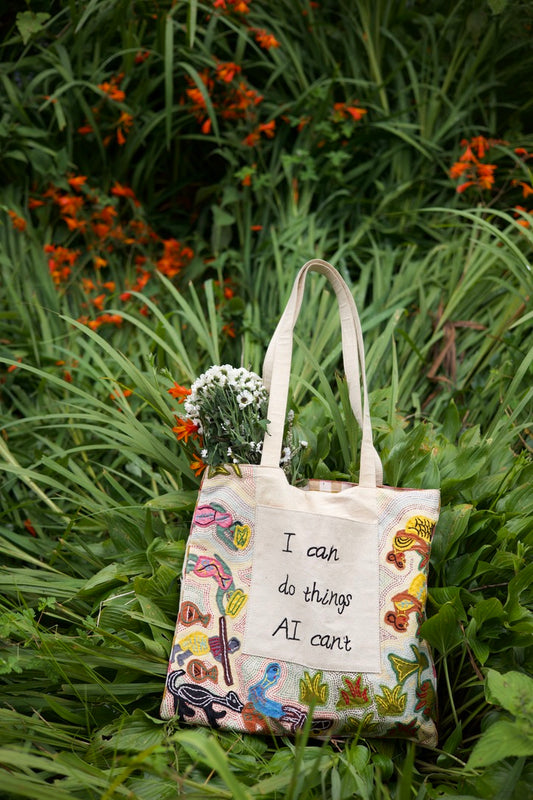What about the Anti AI shirt?
Share

Embroidered by Bandana Lohar, and Inspired by Joana Maciejewska's meme-"I want Al to do my laundry and dishes so I can do art and writing, not for Al to do my art and writing so that I do laundry and dishes." We found a striking irony- Working with women artists in rural areas, we see how their art often waits until house chores, child care, and farming are done. We found humour in this rather absurd association of two worlds.
The house chore shirt uses clothes as a medium to protest. For years women have expressed their feelings and voices through embroidery, and clothing. It is a form of wearing your POV everyday, not only in occasions but even while "shopping for groceries"

The shirt is embroidered using Kantha and patchwork embroidery, a traditional technique used in the region, to make daily objects like blankets, or repurpose old saris (traditional Indian garment) into new ones. They embroider after finishing all their daily work, washing, cleaning, farming, childcare. Their art is deprioritised and their "primary work" takes over their "artistic dreams". We explained the context of the meme, and asked them to imagine with us, what all could they wish to be replaced, so that they can full time work as artists. We wondered together what if AI can do their house chores, farm chores, so that they could do their art. Perhaps there are more artists wondering the same now.

While technological advancements are nothing new, but whose hands are we putting the power in. Are we problem solving for artisans who still don't have access to smart phones, and no access to protect their work. Access to technology is even lesser for women while their artistic work often most vulnerable.
We took the shirt, and used it as an object for conversation with other local artists. We asked Grafitti artist @nami.bangla, to discuss and share thoughts on what he and artists like him might feel about Al.
While he scaled walls alongside the river to spray walls with paint, we joked if Al can do that! For artists often the process is as important as the product. Product is often a culmination of their journey. While we in the urban art scene still have been discussing the possibilities and challenges of Al. Majority of artists in rural area still do not have smart phones. While the urban art world battles against plagiarism, the artists in rural areas battle sustenance, the worlds keep getting smaller and closer.


A seasonal rivers flows through the village that we embroider from. A prosperous rural economy keeps rivers clean. We intend to build income amongst the women of the village such that there tribal land and practises are protected.

Bandana Lohar embroiders Kantha quilts with inspirations around her.
 Let our work build a world where people know how to do things with hands, make art. Kids have clean rivers to swim and stories to tell
Let our work build a world where people know how to do things with hands, make art. Kids have clean rivers to swim and stories to tell




